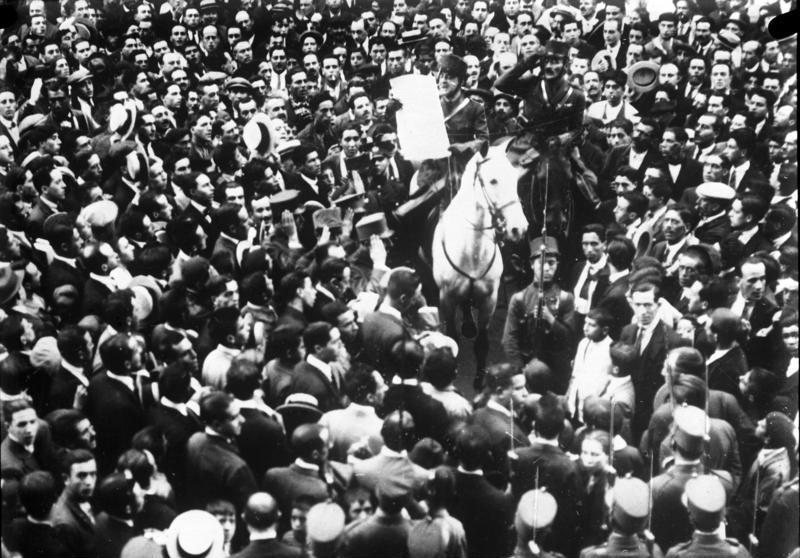|
António Ferro
António Joaquim Tavares Ferro (17 August 1895, Lisbon - 11 November 1956, Lisbon) was a Portuguese writer, journalist and politician, associated with the Estado Novo. Biography In 1915, when he was barely 19, his friend, Mário de Sá Carneiro, appointed him as editor of the magazine '' Orpheu'', precisely because he was still a minor. This position did not last long, however, as Sá Carneiro's father withdrew his financial support after only two issues. During the 1920s, he became a reporter for ''O Século'' and the ''Diário de Lisboa'', was briefly Director of the ''Illustração Portugueza'' and served as an international correspondent for ''Diário de Notícias''. He also contributed prose and poetry to several literary journals. In 1920, he published one of his best known works, a collection of aphorisms and "paradoxes" called the ''Teoria da Indiferença'' (Theory of Indifference). He also produced a self-described "fragmentary novel", ''Leviana'' (Frivolous) and, in ... [...More Info...] [...Related Items...] OR: [Wikipedia] [Google] [Baidu] |
Antonio Ferro
Antonio is a masculine given name of Etruscan language, Etruscan origin deriving from the root name Antonius. It is a common name among Romance language-speaking populations as well as the Balkans and Lusophone Africa. It has been among the top 400 most popular male baby names in the United States since the late 19th century and has been among the top 200 since the mid 20th century. In the English language it is translated as Anthony (given name), Anthony, and has some female derivatives: Antonia, Antónia, Antonieta, Antonietta, and Antonella'. It also has some male derivatives, such as Anthonio, Antón, Antò, Antonis, Antoñito (name), Antoñito, Antonino (name), Antonino, Antonello (name), Antonello, Tonio (name), Tonio, Tono (other), Tono, Toño, Toñín, Tonino (other), Tonino, Nantonio, Ninni, Toto (other), Totò, Tó, Tonini, Tony, Toni, Toninho, Toñito (name), Toñito, and Tõnis. The Portuguese equivalent is António (Portuguese orthography) or ... [...More Info...] [...Related Items...] OR: [Wikipedia] [Google] [Baidu] |
Miguel Primo De Rivera
Miguel Primo de Rivera y Orbaneja, 2nd Marquess of Estella (8 January 1870 – 16 March 1930), was a dictator, aristocrat, and military officer who served as Prime Minister of Spain from 1923 to 1930 during Spain's Restoration era. He deeply believed that it was the politicians who had ruined Spain and that by governing without them, he could restore the nation. His slogan was "Country, Religion, Monarchy." On the death of his uncle in 1921 he became Marquess of Estella. With the support of King Alfonso XIII and the army, Primo de Rivera led a Mussolini-inspired military coup on 13 September 1923.Television documentary from CC&C Ideacom Production,"Apocalypse Never-Ending War 1918-1926", part 2, aired on DR K on 22 October 2018 He was appointed Prime Minister by the King. He promised to eliminate corruption and to regenerate Spain. In order to do this he suspended the constitution, established martial law, imposed a strict system of censorship, and ended the ''turno'' ( spo ... [...More Info...] [...Related Items...] OR: [Wikipedia] [Google] [Baidu] |
Austen Chamberlain
Sir Joseph Austen Chamberlain (16 October 1863 – 16 March 1937) was a British statesman, son of Joseph Chamberlain and older half-brother of Prime Minister Neville Chamberlain. He served as Chancellor of the Exchequer (twice) and was briefly Conservative Party leader before serving as Foreign Secretary. Brought up to be the political heir of his father, whom he physically resembled, he was elected to Parliament as a Liberal Unionist at a by-election in 1892, and held office in the Unionist coalition governments of 1895–1905, remaining in the Cabinet as Chancellor of the Exchequer (1903–05) after his father resigned in 1903 to campaign for Tariff Reform. After his father's disabling stroke in 1906 Austen became the leading tariff reformer in the House of Commons. Late in 1911 he and Walter Long were due to fight one another for the leadership of the Conservative Party (in succession to Arthur Balfour), but both withdrew in favour of Bonar Law rather than risk a party spli ... [...More Info...] [...Related Items...] OR: [Wikipedia] [Google] [Baidu] |
Book Cover Of Teoria Da Indiferença By António Ferro, 1920
A book is a medium for recording information in the form of writing or images, typically composed of many pages (made of papyrus, parchment, vellum, or paper) bound together and protected by a cover. The technical term for this physical arrangement is ''codex'' (plural, ''codices''). In the history of hand-held physical supports for extended written compositions or records, the codex replaces its predecessor, the scroll. A single sheet in a codex is a leaf and each side of a leaf is a page. As an intellectual object, a book is prototypically a composition of such great length that it takes a considerable investment of time to compose and still considered as an investment of time to read. In a restricted sense, a book is a self-sufficient section or part of a longer composition, a usage reflecting that, in antiquity, long works had to be written on several scrolls and each scroll had to be identified by the book it contained. Each part of Aristotle's ''Physics'' is called a bo ... [...More Info...] [...Related Items...] OR: [Wikipedia] [Google] [Baidu] |



